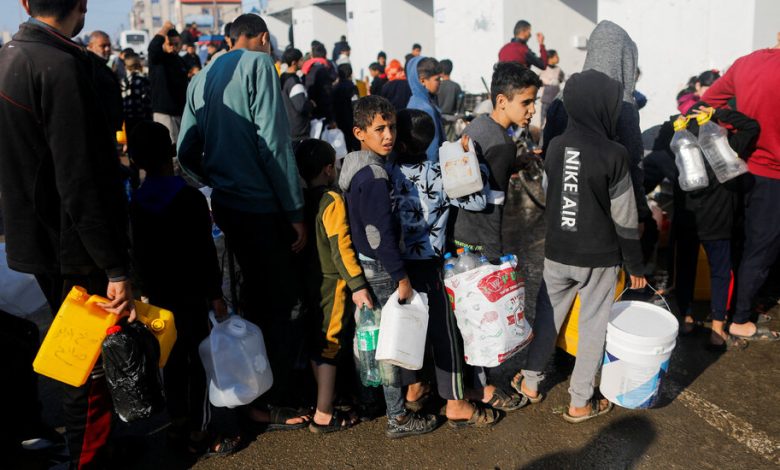Looming Starvation in Gaza Shows Resurgence of Civilian Sieges in Warfare

The number of people facing possible starvation in the Gaza Strip in the coming weeks is the largest share of a population at risk of famine identified anywhere since a United Nations-affiliated panel created the current global food-insecurity assessment 20 years ago.
After Hamas’s surprise attack on Israel on Oct. 7, Israel responded with air and ground assaults and a sealing of the territory, which have left the 2.2 million people who live there deprived of sufficient food, water and supplies. The U.N. has concluded that without significant intervention, Gaza could reach the level of famine as soon as early February.
Limited amounts of food and other aid are entering Gaza from Israel and Egypt at border points with rigorous inspections; the ongoing bombardment and ground fighting make distribution of that aid extremely difficult.
Scholars of famine say it has been generations since the world has seen this degree of food deprivation in warfare.
“The rigor, scale and speed of the destruction of the structures necessary for survival, and enforcement of the siege, surpasses any other case of man-made famine in the last 75 years,” said Alex de Waal, an expert on humanitarian crises and international law at Tufts University who wrote “Mass Starvation: The History and Future of Famine.”
The situation in Gaza is the latest in a series of recent crises that have reversed progress against famine. Mass death from starvation declined steadily from the 1980s well into the 21st century. But over the past seven years, food crises associated with conflict (such as those in Yemen, Syria and the Tigray region of Ethiopia) and those stemming from environmental conditions and climate change (such as in Somalia) have resulted in the loss of more than a million lives.
Gaza is unique, experts say, because the people who live there are sealed in the territory with no recourse to seek food elsewhere.
Israel has vigorously denied allegations that it is responsible for the shortage of food in Gaza.
“There is a sufficient amount of food in Gaza,” Col. Elad Goren, the head of the Israeli agency that oversees policy for the Palestinian territories, known as COGAT, said at a recent news briefing.
“Israel has not, and will not, stand in the way of providing humanitarian aid to the people of Gaza that are not a part of terror,” he continued. “We have not refused a single shipment of food, water, medical supplies or shelter equipment.”
If Gazans do not have access to food, Colonel Goren said, it is because of failures by humanitarian organizations.
“The organizations desperately need to increase their capabilities of receiving and distributing the aid,” he said. “This includes better work processes, more facilities and trucks. There is also a need for additional manpower.”
The World Food Program said that before the war, about 500 trucks a day carried supplies including food to Gaza, which has been under a partial blockade by Israel and Egypt since Hamas took control there in 2007. Last week, the organization said an average of 127 trucks were permitted to cross the main Israeli checkpoint each day. Distributing that limited aid is nearly impossible because of the destruction of communications, shortages in fuel and ongoing Israeli bombardment, the World Food Program and other agencies say.
“Our staff does not feel safe distributing, and people don’t feel safe going to the distributions,” Shaza Moghraby, a spokeswoman for the program, said. “They are lining up for food praying not to be bombed.”
The handful of entry points operate intermittently because of bombing, Ms. Moghraby said, and the Israeli military’s inspection and bureaucratic process means that only a limited number of aid deliveries are cleared each day.
“The need is exponentially higher now because people are relying solely on humanitarian aid for their sheer survival,” said Juliette Touma, spokeswoman for UNRWA, the agency supporting Gaza.
The assessment of the risk of famine in Gaza was made by 30 experts from 19 agencies, convened by the United Nations’ Food and Agriculture Organization. The initiative, the Integrated Food Security Phase Classification, monitors access to food in roughly 50 places around the world at a time.
In crisis zones, it watches for three criteria: if 30 percent of the children are severely malnourished or wasted; if the mortality rate exceeds double the normal level; or if 20 percent of the population has a “catastrophic” lack of food. If any of these thresholds is exceeded, the panel convenes a so-called Famine Review Committee to determine the likelihood of a famine.
Because “the F-word” is so contentious, said Cormac Ó Gráda, a historian of famine and professor at University College Dublin, the hope is that declaring a famine will spur significant intervention — and that even a declaration of imminent risk of famine may propel action.
“If a famine happens, somebody is to blame — and if you can get some international body, which is seen as scientific and objective, admitting that there is a famine, then it is very, very serious for the people who are seen to have caused the famine,” Professor Ó Gráda said. “So the Israelis certainly would not want the U.N. or somebody like the U.N. to declare that there is a famine in Gaza.”
Starvation of civilians was a military tactic in World War II, when more than three million Soviets perished during the Nazi “Hungerplan” and when the U.S. Navy and Air Force ran a campaign officially called Operation Starvation, which blockaded the delivery of food to Japan. From 1958 to 1961, at least 25 million people died in the famine associated with the Great Leap Forward in China.
The famines in Nigeria during its civil war in the late 1960s; in Sarajevo during the Bosnian war in the early 1990s; in Syria’s civil war that began 13 years ago; and in Ethiopia since 2020 are comparable with Gaza as sieges of civilian populations during conflict, Professor de Waal said.
He and other experts contended that whatever the stated reasons, the underlying cause reflected deliberate choices by those with power.
“Famine is normally caused by people, by the decisions of political elites,” said Rhoda E. Howard-Hassmann, a scholar of international human rights and the author of “State Food Crimes.” Reports from Gaza suggest a deliberate decision in Israel to restrict food, she said.
“It’s a political decision or it’s a military decision,” she said, but added, “I’m prepared to accept that possibly there are other factors involved, such as Hamas corruption, Hamas diverting food and so on.”
While hunger crises in regions such as South Sudan and Tigray have unfolded with little media attention, there is intense international scrutiny on Gaza. Statements made early in the war by members of the Israeli government about the intention to deprive the entire population of Gaza of food have drawn the attention of human rights prosecutors.
Itamar Ben-Gvir, Israel’s national security minister, said in a post on X on Oct. 17, “As long as Hamas does not release the hostages in its hands, the only thing that needs to enter Gaza are hundreds of tons of explosives from the Air Force, not an ounce of humanitarian aid.”
The debate about the current circumstance in Gaza — whether it is the result of a deliberate strategy to target civilians or is an unintended and unavoidable consequence of Israel’s assault on Hamas — shows why it is challenging to address through international law.
Prohibition of the starvation of civilians as a method of warfare entered international law in 1977, with an additional protocol to the Geneva Convention.
In 1998, the Rome Statute created the International Criminal Court and made it a war crime to use starvation of civilians as a military tactic in international conflict. The crime is described as intending to deprive a civilian population of food, and also of water, medicine and shelter. The United States and Israel were two of the seven countries that voted against the creation of the court.
There have been no prosecutions in the international court over starvation because most of the human-created famines since then have taken place within national borders.
In 2018, the United Nations Security Council unanimously adopted Resolution 2417, which condemned the use of starvation in conflict and said cases in which armed conflict threatened to create widespread food insecurity should be “swiftly” referred to the Security Council.
However, the Security Council has yet to consider human-made famines: Allies of the countries accused of causing them have consistently acted to keep the issue from debate. The United States repeatedly criticized the Syrian government at the Security Council for its use of starvation, but it took a milder tone when its allies Saudi Arabia and the United Arab Emirates blockaded Yemen, causing widespread hunger.
Experts say it is difficult to apply international justice to famines because they are often caused by blockades in conflict, when the blockading party can claim that it must stop sustenance from reaching an insurgent or terrorist group. Since the Sept. 11 attacks, the idea that the need to act against terrorists takes priority over the protection of civilians has often dominated international relations, Professor de Waal said.
Catriona Murdoch, a legal expert on starvation with the advocacy organization Global Rights Compliance, said that the question of whether there is deliberate intent to deprive a civilian population of food and the other “objects indispensable to survival” described in the U.N. resolution underpins whether a food crisis is a potential crime against humanity. It is not necessary for a famine to occur for an offense to be prosecutable, she said, if intent is proven.
International justice organizations can gather evidence from Gaza now for consideration in a potential prosecution later, when international institutions are more functional.
“These types of investigations take years and years to come to fruition,” Ms. Murdoch said.
Adam Sella contributed reporting from Tel Aviv.





